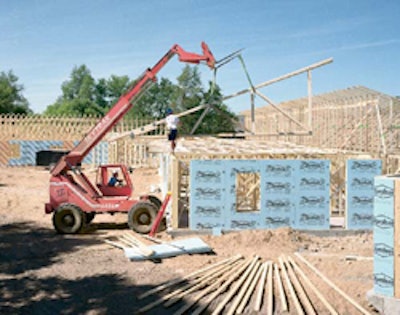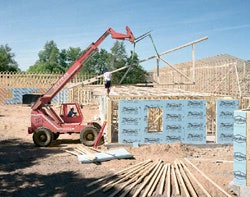

It's happening again. You've been working on a relationship with this builder for months, and now it's landed you steady wood flooring work. As you're scheduling the first jobs, you find out that the builder wants you to install the floors before the HVAC system is running and the painting is done.
He's adamant that you stick to the tight schedule, even after you explain the risks. What do you do now. Install the job and your reputation might be shot; refuse that schedule and you could lose a lot of work - and profits.
There can be myriad problems when wood flooring contractors feel like they have no choice but to install when the general contractor says they must. Foremost among them is moisture content - concrete slabs aren't fully cured, buildings don't yet have windows and doors, HVAC systems aren't running, or wet trades aren't finished. Any one of these situations can wreak havoc on a solid or even engineered wood floor.
The pressure can be twofold when builders pressure wood flooring contractors to not only install before conditions are right, but also to get the job done in a shorter amount of time than is necessary. That can lead to shortcuts with the installation and finishing, says Tony Latella Jr., marketing and sales coordinator for Mamaroneck, N.Y.-based distributor Geysir Hardwood Floors. If it's unfinished flooring, contractors may turn to such short-term solutions as skipping a cut in the sanding process or leaving out a coat of finish. On the prefinished side, contractors may not test concrete slabs. With either type of flooring, contractors may attempt to work when other trades are present.
It doesn't have to work that way. "I tell them, 'Stay calm, be patient and stand your ground.' The major thing is liability. You're either going to do the job right and get paid for it, or there's going to be a problem and you're going to have to go back and fix it at your own expense," Latella says.
The time to talk about scheduling is before the wood flooring contractor actually signs the contract (assuming the flooring contractor follows the good business practice of using contracts - see "Under Contract," August/September 1997, p. 45). Explain the conditions necessary to properly install and finish solid or engineered wood floors. You can use publications such as NWFA's Installation Guidelines and technical publications A100: Jobsite Evaluation, Estimating and Preparation and A400: Water and Wood as support for your case. At Schenck & Company in Houston, Texas, when new customers are sent job proposals, they also get a typewritten handout that explains all the necessary conditions to do the job right.
There are several approaches to take if the general contractor still won't see your point of view.
"I say, 'I assume that you came to me because you think we can do the best job for you. I can't do that unless you give me the proper parameters.'" says Greg Schenck, Schenck & Company president.
"Generally, when you put it in that light, they're more cooperative."
If all your concerns, explanations and written proof fall on deaf ears, however, and the pressure is on for you to install in a situation you think is unacceptable, you've got to make a decision: bail out now or go ahead with it. Turning down the job-and the money-can seem ridiculous in the short term, especially if you have just started out in the market.
"You take small contractors who've been making $12 or $16 an hour working with a company and then go out on their own. You wave big money in front of them and they bite the hook every time.
Usually it bites back," says Daniel Boone, NWFA's director of technical training.
"You feel fortunate just getting the work in the first place," says Brian Clark, recalling his first years in the industry with Heritage Hardwood Flooring Ltd. in Calgary, Alberta. "You don't want to step out of line and say 'We're leaving if you don't do it this way.' You wonder: If you leave, are you ever going to get the opportunity to come back."
It's working for years to build a reputation for quality, though, that will enable you to avoid these situations in the future and nurture relationships with contractors interested in the long run.
If you're facing a job where you decide the benefits outweigh the risks, make sure you are waived of responsibility for any problems in writing. Detail your concerns in the contract itself or have the general contractor sign a waiver of responsibility (waivers of responsibility are available to NWFA members). Then, as you work on the job, document things such as moisture content of the flooring when it is delivered, installed and finished, helping to prove that moisture problems down the road were not present when you were working on the flooring.
Even after contracts are signed and you and the GC are in agreement, conflicts can still occur with other trades. If you show up to put on a final coat of finish and the plumber is doing some last-minute work, it could make a mess of your finish. If you are working with prefinished floors, other trades present can mean scratches or gouges in your floor. In such a case, Clark calls the job foreman and explains: "If they want the owner to move in on time, either the trade has to leave or we'll do our job and if there's a service request, we'll have to be paid to go back and correct it. Eighty to 90 percent of the time that is respected." Boone agrees: "I've had plenty of GCs say, 'You're the hardest guy I've ever worked for, but you get the job done.' You just have to get in their face and stick to your guns. If not, you could lose hundreds of thousands of dollars."
Wood flooring contractors generally find that as the cost of the new home increases, the headaches from scheduling problems diminish. The problem can be rampant, though, with new tract home construction. "The building time is roughly three to four months on a house," says Clark, and times can even be pushed to 60 days. "Everybody's so busy that the subtrades sort of come and go as they like, as opposed to having a schedule from a builder. We've been fortunate to get away from that."
Wood flooring contractors also find that in general, commercial construction can be a struggle, to the point where some contractors avoid it altogether. "They're even less cooperative about giving us proper conditions," says Schenck. "The schedules are very inflexible. They put all the trades in and let them fight among themselves."
Those situations can happen with any type of construction, though. The smart wood flooring contractor will catch them before they happen and not get pulled into a bad situation. The financial risks can imperil your business, and the cost to your reputation can be even more damaging. "To me, what's important is how the job turns out," Schenck says. "If it's not something we can go back and be proud of, it's a bad reflection on us, and then we did it for nothing."




























